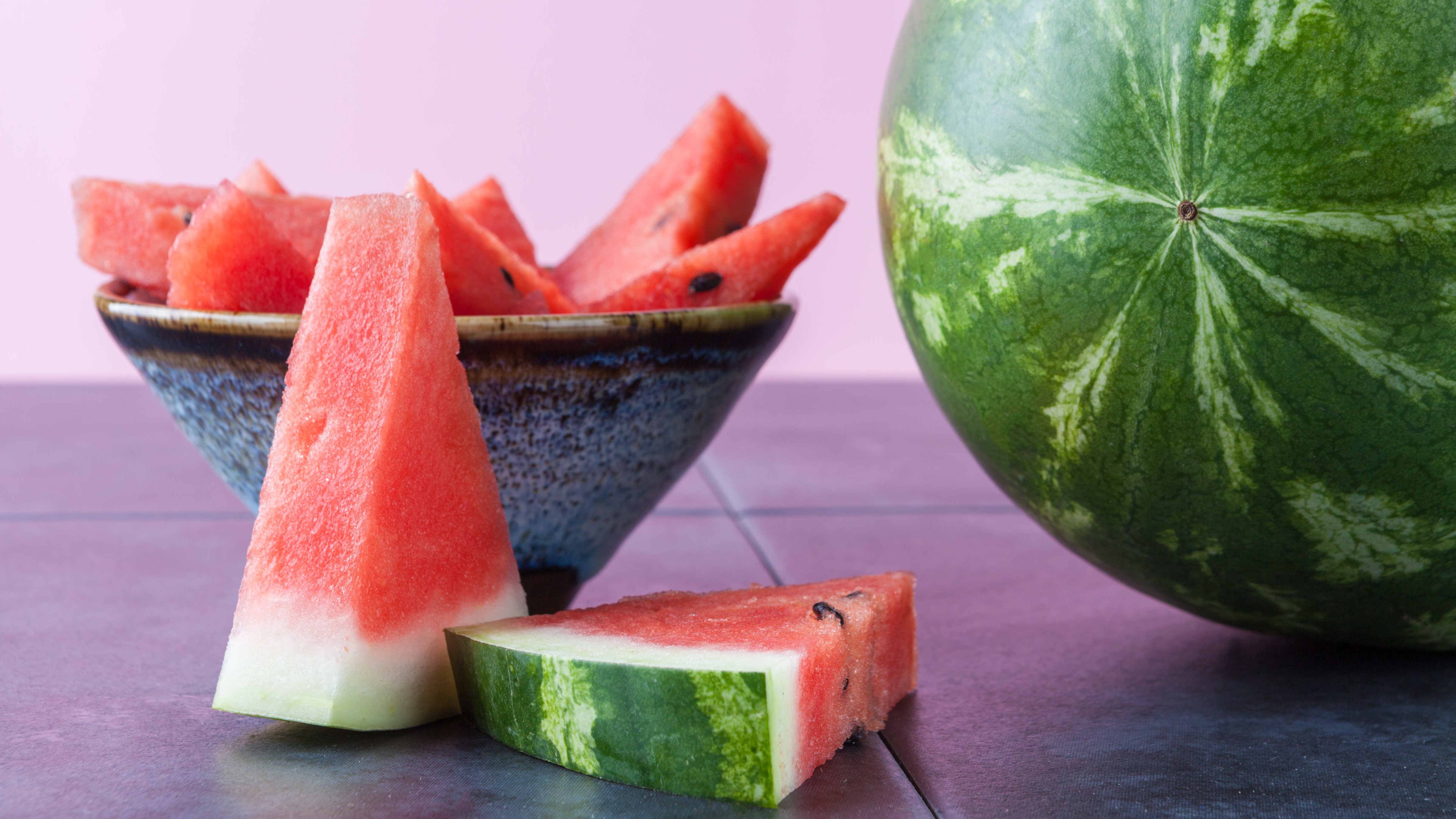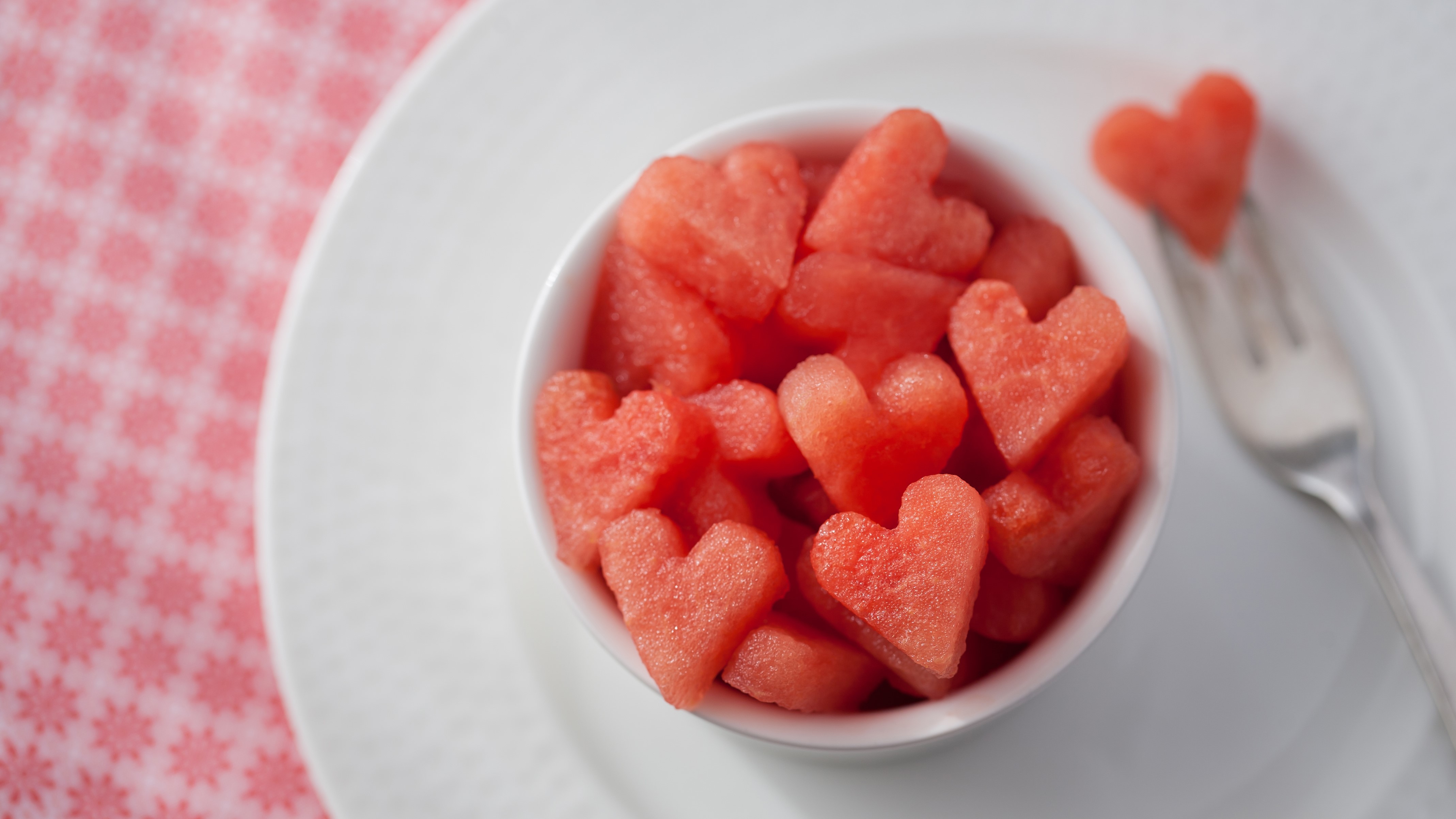Watermelon: Health benefits, risks & nutrition facts
Watermelon is a refreshing fruit full of healthy vitamins.

Watermelon (Citrullus lanatus) is a delicious fruit which contains many nutrients, is low in calories and is free of fat. You can eat all parts of the watermelon including the rind and seeds, according to health website Healthline.
A watermelon is approximately 92% water according to Healthline. Each juicy bite has significant levels of vitamin A, vitamin B6 and vitamin C, lots of lycopene, antioxidants and amino acids. Watermelon even contains a modest amount of potassium.
"Amino acids are the basic building block for protein, and protein is used in virtually every vital function in the body." said Angela Lemond, a Texas-based registered dietitian, nutritionist and spokesperson for the Academy of Nutrition and Dietetics.
Related: How much water do you really need to drink?
Watermelon health benefits
Watermelon contains some of the highest lycopene levels of any type of fresh fruit. Lycopene is a phytonutrient, which is a naturally occurring compound in fruits and vegetables that are produced to fend off attacks by bacteria, fungi or viruses. Some studies suggest phytonutrients are likely to play important roles in the body. Lycopene is also the red pigment that gives watermelons, tomatoes, red grapefruits and guavas their color. According to the U.S. Department of Agriculture, a cup and a half of watermelon contains about 9 to 13 milligrams of lycopene — 40% more lycopene than raw tomatoes.
Here are the nutrition facts for the watermelon, according to the U.S. Food and Drug Administration, which regulates food labeling through the National Labeling and Education Act:
– Serving size: 2 cups diced (10 oz / 280 g) Calories: 80 (Calories from Fat 0)
– Amount per serving (and %DV*) *Percent Daily Values (%DV) are based on a 2,000 calorie diet.
– Total Fat: 0g (0%)
– Total Carbohydrate: 21g (7%) Dietary Fiber: 1g (4%) Sugars: 20g
– Cholesterol: 0mg (0%) Sodium: 0mg (0%) Potassium: 270mg (8%) Protein: 1g
– Vitamin A: (30%) Vitamin C: (25%) Calcium: (2%) Iron: (4%)
In small studies in human cells and animals, lycopene has been linked with heart health, bone health and prostate cancer prevention.
To really maximize your lycopene intake, you need to let your watermelon fully ripen. The redder your watermelon gets, the higher the concentration of lycopene becomes. Beta-carotene and phenolic antioxidant content also increase as the watermelon ripens.
Get the world’s most fascinating discoveries delivered straight to your inbox.
A 2011 study in the Journal of Food Composition and Analysis, which investigated five types of watermelon at four stages of ripening, found that unripe watermelon with primarily white flesh has nearly zero beta-carotene present. By the time it is fully red, the fruit is an excellent source of the phytonutrient.
However, that doesn't mean the red parts are the only good ones. "All parts of the watermelon are good. There are a lot of nutrients throughout," Victoria Jarzabkowski, a nutritionist with the Fitness Institute of Texas at The University of Texas at Austin. This includes the white flesh nearest the rind, which contains more of the amino acid citrulline than the flesh, according to a 2005 study in the Journal of Chromatography.
Citrulline is an amino acid that converts to the amino acid arginine. In lab dishes, arginine seems to stimulate nitrous oxide, which can lower blood pressure, according to a 2009 study in the journal Clinical and Experimental Pharmacology and Physiology.
Recent studies have also found that watermelon seeds are packed with other nutrients, especially if they are sprouted and shelled. They are high in protein, magnesium, vitamin B and good fats, according to an analysis by the International Journal of Nutrition and Food Sciences.
Heart health and anti-inflammatory benefits
In studies of mice, high levels of lycopene reduced the risk of damage from a high cholesterol diet Purdue University. A study published in the American Journal of Hypertension found that watermelon extracts helped reduce hypertension and lowered blood pressure in obese adults.
Watermelon may also be especially important for older women. A study published in Menopause found that postmenopausal women, a group known to have increased aortic stiffness, who took watermelon extract for six weeks saw decreased blood pressure and arterial stiffness compared to those who did not take watermelon extract. The authors of the study attributed the benefits to citrulline and arginine.
Animal studies suggest arginine can help improve blood flow.
"The lycopene in watermelon makes it an anti-inflammatory fruit," Jarzabkowski said. Lycopene is an inhibitor for various inflammatory processes and also works as an antioxidant to neutralize free radicals.
Other benefits and cancer prevention
"Watermelons help with overall hydration, and that is a great thing," said Lemond. "They say we can get 20-30 percent of our fluid needs through our diet alone, and foods like these certainly help." Additionally, their juice is full of good electrolytes. This can even help prevent heat stroke.
The watermelon also contains fiber, which encourages a healthy digestive tract and helps keep you regular.
A cup of watermelon contains nearly one-quarter of your recommended daily intake of Vitamin A.
Like other fruits and vegetables, watermelons may be helpful in reducing the risk of cancer through their antioxidant properties. In lab dish and animal studies, lycopene reduced prostate cancer cell proliferation, according to the National Cancer Institute.
Watermelon-loving athletes are in luck: drinking watermelon juice before an intense workout helps reduce next-day muscle soreness and heart rate, according to a small study of seven athletes published in the Journal of Agricultural and Food Chemistry.
A 2015 study published in the Journal of Applied Physiology suggests that watermelon's citrulline may also help improve athletic performance. Study participants who took citrulline supplements saw a boosted performance with more power production in high-intensity exercise like cycling and sprinting.
What happens if you eat too much watermelon?
If eaten in reasonable amounts, watermelons should produce no serious side effects.
However, high levels of consumption could cause some discomfort. For instance, the consumption of more than 30 mg of lycopene daily could potentially cause nausea, diarrhea, indigestion and bloating, according to the American Cancer Society.
Loading up on water-dense foods like watermelon can be tempting for those looking to lose weight because they help you feel full, but Lemond cautions against going to extremes. "Eating more fruits and vegetables of any kind naturally helps decrease overall calories (energy) of the diet," she said. "We know that people that eat higher quantities of fruits and vegetables typically have healthier body weights. However, I do not recommend eating only watermelon … You will lose weight, but that weight will be mostly muscle."
Jarzabkowski also warns watermelon lovers to be mindful of their sugar intake. "Though watermelon's sugar is naturally occurring, [watermelon] is still relatively high in sugar."
Seedless watermelon
Seedless watermelons are triploid which means they have three sets of chromosomes. This odd number of chromosomes makes them sterile and unable to produce seeds. The sterile hybrid is created by crossing male pollen for a watermelon, containing 22 chromosomes per cell, with a female watermelon flower with 44 chromosomes per cell. When this seeded fruit matures, the small, white seed coats inside contain 33 chromosomes.
Additional resources
Explore some fun facts about watermelons, from the National Watermelon Promotion Board and Science Kids. Discover 50 things to do with watermelon with Good Housekeeping. Learn how to grow your own watermelon with Better Homes and Gardens
This article is for informational purposes only and is not meant to offer medical advice.
Jessie Szalay is a contributing writer to FSR Magazine. Prior to writing for Live Science, she was an editor at Living Social. She holds an MFA in nonfiction writing from George Mason University and a bachelor's degree in sociology from Kenyon College.



